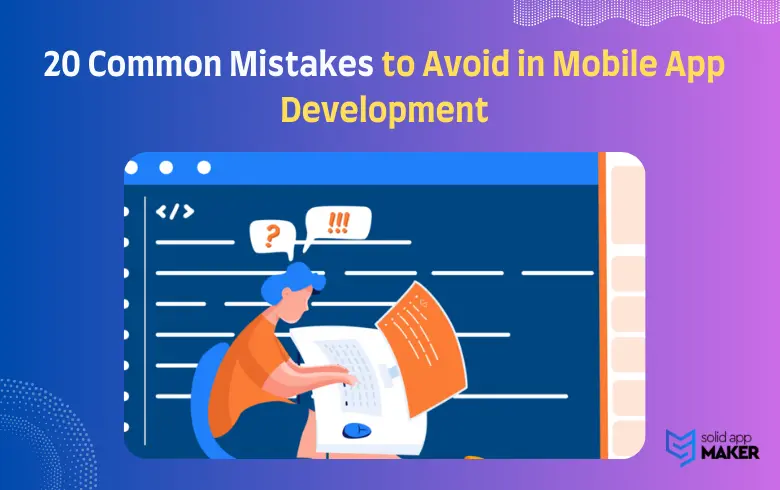Mobile app development stands at the forefront of technological innovation, offering endless possibilities for businesses and individuals alike. However, amid the excitement, developers often encounter pitfalls that can hinder the success of their creations. In this article, we’ll explore the 20 common mistakes to avoid in mobile app development, guiding developers toward a path of excellence.
Skipping Market Research
Market research is the compass that should guide every app developer’s journey. Skipping this crucial step is akin to sailing into uncharted waters without a map. Effective market research involves understanding the target audience, analyzing competitors, and staying abreast of market trends. This comprehensive approach ensures that the developed app aligns with user needs and preferences, giving it a solid foundation for success.
Ignoring the User Experience (UX)
The user experience (UX) is the soul of a mobile app. Neglecting it can lead to user dissatisfaction and a decline in app retention rates. A successful app not only fulfills a functional need but does so with a seamless and enjoyable user interface. Prioritizing UX involves creating an intuitive design, optimizing navigation, and ensuring a visually pleasing aesthetic. This approach not only attracts users but keeps them engaged and satisfied.
Overlooking Platform Compatibility
In a world of diverse mobile platforms, overlooking platform compatibility is a cardinal sin. Users access apps on various devices and operating systems, and a failure to consider this diversity can limit an app’s reach. Cross-platform development is a strategic approach that allows developers to create a single codebase that can run on multiple platforms, ensuring a broader audience can access and enjoy the app.
Inadequate Testing
Testing is the unsung hero of mobile app development. Rushing or neglecting this phase can result in a slew of issues, from minor bugs to major glitches that compromise the user experience. Thorough testing involves assessing the app’s functionality, performance, and security. Investing time and resources in testing ensures that the app released to users is polished, reliable, and free from disruptive errors.
Ignoring Security Measures
As the digital landscape evolves, so do security threats. Ignoring security measures in mobile app development is a risky gamble with user data. Implementing robust security features, encrypting sensitive information, and staying informed about the latest security trends are essential steps in safeguarding user trust and protecting the app from potential cyber threats.
Neglecting App Performance
Users demand speed and efficiency from mobile apps. Neglecting performance optimization can result in sluggish and unresponsive apps, frustrating users and leading to high abandonment rates. Developers must prioritize performance optimization by employing techniques such as code optimization, efficient memory usage, and leveraging caching mechanisms. A well-performing app not only satisfies users but also contributes to positive reviews and increased retention.
Poorly Defined Objectives
Without clear objectives, app development becomes a directionless endeavor. Developers must define the purpose and goals of the app, aligning them with the expectations and needs of the target audience. This clarity not only guides the development process but also ensures that the end product resonates with users and fulfills a specific need in the market.
Ignoring Feedback Loops
User feedback is a goldmine for app developers. Ignoring or underestimating its value is a missed opportunity for improvement. Establishing effective feedback loops through user reviews, surveys, and direct communication allows developers to understand user preferences, identify pain points, and continuously enhance the app based on real-world insights.
Inefficient Resource Management
The delicate balance of time, budget, and resources is a common challenge in app development. Inefficient resource management can lead to delays, cost overruns, and overall project chaos. Prioritizing effective resource management involves meticulous planning, allocating resources wisely, and maintaining open communication within the development team. A well-managed project ensures that development progresses smoothly without compromising on quality.
Rushing the Development Process
In the fast-paced world of technology, there’s often pressure to deliver apps quickly. However, rushing through the development process can be a costly mistake. Taking the time to plan, strategize, and execute each phase thoroughly pays dividends in the form of a well-crafted, high-quality app. A thoughtfully developed app not only meets user expectations but also stands the test of time in a competitive market.
Disregarding App Monetization Strategies
Monetization is the lifeblood of sustained app development. Disregarding effective monetization strategies can lead to financial instability and the potential failure of an otherwise excellent app. Developers should explore diverse revenue streams, including in-app purchases, advertisements, and subscription models, to ensure the app remains financially viable in the long run.
Neglecting Regular Updates
Technology evolves rapidly, and mobile apps must keep pace. Neglecting regular updates can result in an outdated app that fails to meet user expectations. Developers should stay proactive by consistently updating their apps, introducing new features, and adapting to emerging trends. Regular updates not only keep the app relevant but also demonstrate a commitment to ongoing improvement.
Underestimating the Importance of Analytics
Analytics provide a window into user behavior, app performance, and market trends. Underestimating their importance is a missed opportunity for data-driven decision-making. Leveraging analytics tools such as Google Analytics, Flurry Analytics, or Mixpanel allows developers to make informed decisions, refine their app based on user engagement patterns, and stay competitive in a dynamic market.
Lack of Scalability
The failure to plan for scalability is a common oversight in app development. Developers must anticipate potential user growth and design app architecture with scalability in mind. This ensures that the app can handle increased demand without sacrificing performance, providing a seamless experience for users, whether there are hundreds or millions of them.
Conclusion
Mobile app development is a challenging yet rewarding journey. By steering clear of these common mistakes, developers can pave the way for successful apps that not only meet user expectations but exceed them. Remember, meticulous planning, continuous improvement, and a commitment to excellence are the cornerstones of creating mobile apps that stand out in the competitive digital landscape.

